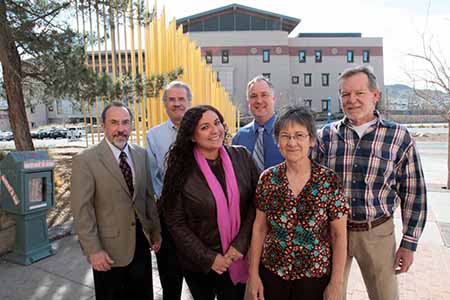By Daniel Perez
UTEP News Service
El Paso native Pam Cruz was intrigued by the concept of the Peace Corps when she learned about it in high school. After some additional research, she came to a simple conclusion.
“Live in another country and help a host community. Who wouldn’t want to apply for the Peace Corps?” she said. The organization pays trained volunteers to travel to foreign lands to fill a need and promote friendship and mutual understanding between countries and cultures.

She enrolled at The University of Texas at El Paso and took classes to enhance her marketability for the Peace Corps: French, Spanish, grant writing and international relations. She graduated in 2010 with her bachelor’s degree in political science and was accepted into the corps. She was sent to the Republic of Mali in western Africa where she helped with water sanitation, food security and malaria monitoring.
Cruz, now a UTEP political science graduate student, is part of a team of campus Returned Peace Corps Volunteers (RPCV) eager to share the corps’ vision with their Miner family. The group, mostly UTEP faculty, will officially kick-start their effort with several activities to celebrate Peace Corps Week Feb. 23 to March 1.
The annual event is a national effort to enlighten the public about the mission, goals and benefits of the Peace Corps, which President John F. Kennedy established in 1961. Since then, more than 215,000 volunteers have been assigned to 139 countries to work with governments, schools, and nonprofit and nongovernment organizations in fields including education, business, information technology, agriculture and the environment. One hundred forty-one of those volunteers are UTEP alumni.
The University’s RPCVs will share their experiences and take questions during panel discussions from 11 a.m. to noon Thursday, Feb. 27, and from 2 to 3 p.m. Friday, Feb. 28, in Union Building East, Room 102.
Thursday’s scheduled participants are Cruz; Arturo Pacheco, Ph.D., professor of education and director of UTEP’s Center for Research on Educational Reform; and Kathleen Staudt, Ph.D., professor of political science. Pacheco served in Thailand and Staudt in the Philippines. Friday’s panel will feature Jon Amaste, Ph.D., professor of languages and linguistics; John McClure, Ph.D., professor of metallurgical and materials engineering; and William MacKay, Ph.D., professor of biological sciences. They served in Dominica (part of the Eastern Caribbean), Ghana and Colombia.
Other activities include a presentation by Staudt and Cruz from 3 to 4 p.m. on Monday, Feb. 24, in the Undergraduate Learning Center, Room 210; and Peace Corps participation in a Study Abroad Open House from 10 a.m. to 2 p.m. on Wednesday, Feb. 26, in the Liberal Arts Building, Room 302.
Representatives also will be available to answer questions at information tables from 11:30 a.m. to 1:30 p.m. Monday, Feb. 24, in the University Library’s second floor lobby, and on Tuesday, Feb. 25, at Leech Grove.
“We want UTEP students to know that the Peace Corps is available to them,” said April Rumgay, a junior political science major. Rumgay was recently hired as a part-time student assistant to oversee UTEP’s Peace Corps office, located in Room 218 of the Mike Loya Academic Services Building.
Organizers plan to explain the lengthy application process used to recognize serious candidates, the placement process and the cultural training after a volunteer is selected. The goal is to have the person ready for a two-year overseas assignment. Volunteers earn monthly stipends and are paid a readjustment allowance when they finish their tours. Most consider it a life-changing adventure.
UTEP students make great Peace Corps candidates because of their diversity, said Shawn Abeita, the corps’ recruiting representative whose territory encompasses El Paso and the state of New Mexico. He said many UTEP students are adaptable to other cultures and often are able to share knowledge of Mexican and American cultures in their adopted country.
Abeita, a returned Peace Corps volunteer assigned to Panama, was quick to share that the corps’ first training class in the country was at Texas Western College (now UTEP). Peace Corps leaders initially wanted the training at UT Austin, but decided on UTEP because it was desegregated.
Abeita tells students how the corps can help them achieve their academic and career goals.
“If your aspirations are to attend grad school, work for the Department of State in the Foreign Service, or further your public service, you should consider (the Peace Corps),” he said.
Answering the call to service, such as working with the Peace Corps, is one of the criteria used by Washington Monthly magazine to rate national universities. UTEP ranked #7 in the magazine’s 2013 college rankings.
Gary Frankwick, Ph.D., associate dean in the College of Business Administration and professor of marketing and management, is one of the campus’ returned Peace Corps volunteers who organized the campus support group.
Frankwick, who served in the Philippines in 1977-78, said the University is in the initial stages of creating a master’s degree in international studies that would serve as an academic Peace Corps preparation program. UTEP’s RPCVs are searching the University’s catalogs to identify courses that are international in scope and raise awareness of issues affecting developing countries such as trade, politics, economics and the environment.